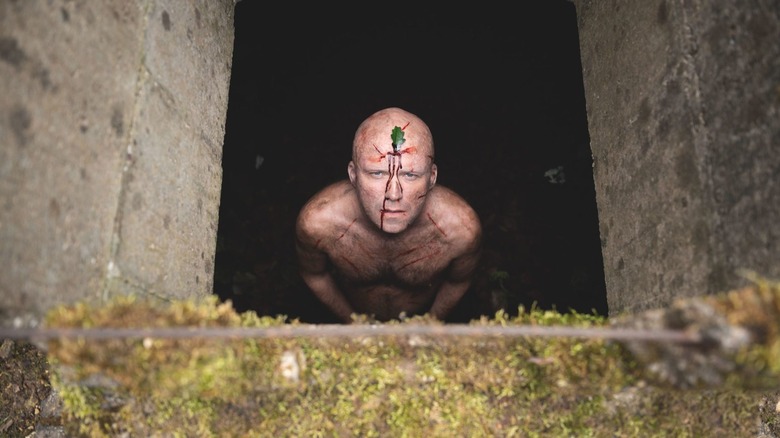Alex Garland Isn't Worried About What Message You Take From Men
In Alex Garland's 2022 puzzling surrealist horror folktale "Men," Jessie Buckley plays a young woman who, while staying at a remote rented manse in the British countryside, seems to incur the ancient ire of some kind of masculinity deity. While on a walk in the woods, she sees the silhouette of a man at the end of a dark tunnel. Fleeing the figure, she runs off the trail and finds an abandoned industrial building. Standing outside like a sentry is a naked man who silently watches her. The same man will follow her back to the house where she is staying. The police are ineffectual. The man she rented the house from is a bit doltish. The local teen insults her, and the local clergyman is brazenly accusatory about a dark moment from her past. All the men, including the teen, are played by Rory Kinnear.
"Men" ends with a dreamlike freakout wherein all the men in town seem to transform and beget one another in an extended SFX sequence as weird as anything this side of a Brian Yuzna movie. The sequence culminates in a weirdly direct connection to trauma from Buckley's recent past involving her accusatory late husband (Paapa Essiedu). "Men" is rife with Edenic images, as well as gender-related poetry older than Christianity. It seems to be drawing modern-day sexism directly over a larger map of cultural male anxiety that stretches back millennia. That is but one, broad interpretation of "Men," as the film possesses myriad additional details that can be dissected and analyzed.
And even that interpretation could be a mere surface-level reading. The truth is Garland doesn't seem too concerned with what themes or messages analysts take from "Men." He said as much in a May 2022 interview with the New York Times.
[Messing] with people
This is, Alex Garland says, by explicit design. He admits to a impishly playful streak, hoping audiences come to him and not the other way around. His film "Ex Machina," for instance, can be taken as a treatise on artificial intelligence, when just below the surface it's a story of sexism (the film is about two men who create a robotic woman, based on a porn profile, and go about testing how "womanlike" she is by gauging how well she deceives men). "Men" is a ghost story of sorts, an essay, and a historical analysis, if you're willing to do some research into pre-Christianity poetry and symbolism. Garland seems to want viewers to do the research:
"Over the years, I have been consciously putting more and more into the hands of the viewer. There's probably another element to it, too, if I'm honest, which is that it's making the viewer complicit. This is another reason to pull back, because there's a part of me which is really subversive and aggressive and is kind of [messing] with people. At times, I felt with 'Men' that I've gone so far that it's borderline delinquent."
Of course, doing the research won't guarantee you'll key into Garland's intentions. A director may have a thesis in mind when they make a film, but once it reaches the public, they may add no more to the piece. If a popular misinterpretation becomes the central talking point, the film starts to become an essay on that thing. Garland says his movie was misinterpreted by friends:
"I've got good friends who I really respect who I've shown 'Men' to, and their convinced interpretation — 'I know what this film is saying, it's saying this' — is 180 degrees different from what I thought it was."
What was intentional?
If Alex Garland likes putting so much of his material into the hands of his audience, expecting them to make their own interpretations, wouldn't that mean he expects "misinterpretations" to be common and even desired? If an artistic experiment is made to gauge various audience reactions, and the intent is to provoke something unexpected, surely a sign of success is when an audience member comes up with something wholly out of the blue. Garland says, perhaps ironically, that that is also not the case. Misinterpretations, he seems to argue, are a mere weary part of the pop analytical process. He continued to the Times:
"[I]t just feels inevitable. When we're watching a film, we have these responses that on a rational level, we know are subjective, but we treat them as if they're objective, and that's just the way it is. I have such distrust in my own responses and other people's responses as being reliable — they could vary on a day-by-day level. So when I offer something up, I have no expectation that everybody's going to agree on it. I have a full expectation that people will disagree, and I see it primarily as a reflection on them."
This may be a frustrating attitude for a filmmaker to affect when one seeks concrete answers, but Garland has a vital point to make in that interpretation of surreal imagery can alter meaning depending on the person, that person's mood, or that person's experience, and that certainly can apply to a filmmaker as well. What "Men" ultimately emerges as, then, is a strange miasma of images and themes, connected only in dreamlike, meant to evoke moods and invoke themes. "Men" is not a formal essay, but a Rorschach test.
What do you see?


